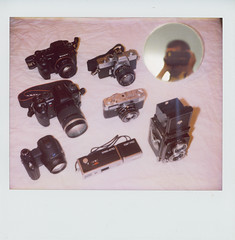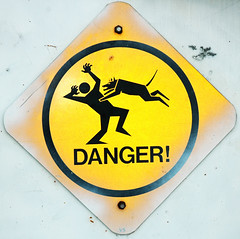Your Guide to Buying Old Film Cameras
With the boom in digital cameras, used film equipment has been dropping in price and increasing in availability. Many people switch over to digital and decide to get rid of their old film stuff that they'll probably never use again. This is good news for anybody wanting to get into film — cameras and lenses are insanely cheap (though, not the ones shown in this first photo!).
The cheap old film cameras are fun to use and great to experiment with. If you currently use a digital camera with all the bells and whistles, I'd suggest looking into a fully manual film camera from the 50's, 60's, or 70's. There's a huge selection of these cameras out there, and most of them are still in great working condition.
Here are some things to think about when looking for a new used camera. And for additional reading on the topic, check out Antonio Marques' 5 Tips for Acquiring Old Cameras.
FIGURING OUT WHAT YOU WANT
Before you start looking for that old film camera, you should probably have an idea of what you're looking for. There are so many cameras out there, and you could end up wandering aimlessly if you don't have any notion of what you're after. Here are three ways that you can use to help you define what you're looking for.
One way to start refining your selection is to choose a type of camera. Maybe you want an SLR, or a rangefinder, or a TLR, or maybe a box camera. Find something that interests you and meets your needs. Be aware of camera types that require removable lenses, and be aware of the type of film they use. Some film formats are no longer offered, extremely hard to find, or very expensive.
Another way to narrow your search is by selecting a film format. Be sure you choose a film that you can actually buy or one that can be re-spooled from a standard film. You'll have a wide selection of cameras if you stick with the 135 format, or 35mm film. But maybe you want to jump into medium format and find something that takes the common 120 format. If you want to know what's readily available, visit your local camera shop or film store and see what they have.
And yet another method of refining your selection is by brand, or camera manufacturer. If you're a brand loyalist like me (I love Minoltas), you'll limit your searches and avoid comparing across brands. But beware, there are a ton of old camera manufacturers out there, so this may not be the best method of selection unless you feel very strongly about one in particular.
Oh, and one last thing… figure out what you're willing to pay for the camera BEFORE you start looking at them. If you want to keep it under $50, keep it under $50. Going into a camera purchase without a budget is a bad idea no matter what kind of camera you're buying.
DOING YOUR RESEARCH
Once you've figured out your direction, start looking around the web and do some research. Wikipedia and Camerapedia are good places to do general research on cameras. Look around on the sites that sell the cameras and get a feel for the price and condition of the cameras. During this process, you may end up selecting a particular model that you're interested in, or you might even change your mind from your original intentions.
Search around for reviews, follow threads in forums, and basically dig up anything you can on your camera. The more you know about it, the better you'll be able to interact with sellers. If you go into a camera purchase not knowing the basics of how it works or the features it has, you won't know what to ask or what to look for.
THINGS TO WATCH OUT FOR
Different cameras will have different things to watch out for, but some things are similar across all cameras. I'm talking about spotting problems and avoiding bad equipment and sellers. Ultimately, what you're after is a working camera at a fair price. Here are some things to look out for while scoping your equipment.
Watch out for prices out of the ordinary. You ought to have a feel for the going price on your camera — if you see one that's priced too high, you might want to keep looking. Likewise, if you see something that's listed way too low, there's a good chance that the seller isn't trustworthy or there's something wrong with the camera.
Make sure everything is in working order. Some sellers don't know the camera as well as they should — I recently bought a rangefinder “in working condition” and it showed up with a broken rangefinder mechanism! That sort of thing is kind of important. You'll also want to make sure that things like the shutter, aperture blades, and film winder are working properly. Try to get a feel for the condition of the glass, and ask about scratches, dust, and fungus. Old camera bodies are pretty tough and scratches won't do any harm, but watch out for cameras that are terribly beat up.
When was the camera last used? If it was recent and the seller is stating that it's in working condition, then it's likely that the camera will be fine. If the camera hasn't been used in decades or if the seller is selling for a friend or relative, I'd be cautious. Old cameras will keep working for quite a while as long as they're maintained and used often. If they sit in the closet for too long, things will start to rust and stick.
Cameras are sold for parts. Make sure you read the description for the camera you're buying — some cameras are sold with the statement that they do not work and they could be used for repair or replacement parts. Don't assume that all cameras for sale are in working order.
WHERE TO FIND FILM CAMERAS
There are plenty of places out there to buy used cameras. Here are a few that I've come across.
- EBAY
Most of my film cameras came from eBay. The selection is great, prices are low, but the risk is slightly higher than other avenues. On eBay, it's important to predefine your spending limit and don't let yourself get caught up in bidding wars. It's also important to fully read the product descriptions and ask the seller questions if anything is unclear.
See eBay Film Cameras Under $50 - B&H PHOTO VIDEO
B&H is a great store to buy new photo equipment and they're a highly trusted source in the industry. They also offer used equipment and they have a collection of old film cameras to browse through. The selection is smaller than that of eBay, but the equipment is tested and inspected by B&H before it's offered for sale.
Take a Look at the B&H Used Gear - ADORAMA
Adorama is another highly trusted source of photography equipment, and they also offer used equipment for sale. Again, items listed can be trusted to work more than those coming from eBay. They also have a nice little article on bargain-hunting in the film camera department — a nice little guide to the different types of film cameras you can find there.
Browse Through Adorama's Used Cameras - GOOGLE PRODUCT SEARCH
Google does it all… even shopping online. If you can't find what you're looking for at other specific sources, you might give this a try and see where it points you. The nice thing about it is that you can set a price range in your search criteria so you have less crud to weed out.
See Film Cameras from Google Product Search - OZ CAMERA
An avid film photographer I know turned me on to this site. John Cooper from Australia runs it as a hobbyist collector, but many of the cameras found there are also for sale. He's got a very nice collection of some obscure cameras that you won't readily find elsewhere. It's best to go in there knowing which brand you're after.
See the Goods At OzCamera - BLACK MARKET ANTIQUES
I just recently found this online antique shop which is based out of Pennsylvania (go figure). They also have some really interesting finds, and most of the stuff is quite old. The prices are ridiculously low, so it's definitely worth a browse.
Check Out the Oldies at Black Market Antiques - ANTIQUE SHOPS
If you live in an area with antique shops, go check them out and see if they have any cameras. Ask them if they typically get cameras, and you might even have them give you a call when new stuff arrives. - SWAP MEETS
If buying old cameras online isn't your thing, check out the local swap meets and flea markets. Sometimes you'll encounter people with massive collections of cameras, and sometimes you'll find hidden gems amongst the other stuff. The nice thing about this method of buying is that you can tinker with the camera and try to determine if things are in working order. - FAMILY
It seems like everybody who grew up in the film-era has at least one old film camera lying around. Sometimes you never know until you ask them! My dad gave me his old SLR, my grandfather pulled out a pristine Canon AE-1 and an old Polaroid camera the other day, and my Mother-in-Law still has her Kodak Instamatic 44. So ask around and you might be able to resurrect and old film camera at little or no cost!
GETTING THE MOST OUT OF YOUR CAMERA
Once you get your camera and you determine that everything works properly, go have some fun! Use it, and use it often. Take it out without bringing any digital cameras along. The best way to kill your film focus is to bring a digital camera along “just in case” you need it or something. Once you learn how to use it efficiently, you might even prefer it over your shiny new digital camera.
Keep it clean and store it in a place away from moisture or extreme temperatures. Letting these old metal cameras sit for too long can cause them to freeze up. Hi-tech materials weren't as readily available in the 1950's as they are today, so your camera parts will be more prone to damage and decay… which is probably why they're built like tanks.
Experiment with different films. This is the great thing about film — you can totally change what your camera produces just by changing the film. There's more to black & white film that just black & white. You get to play with things like differences in grain, contrast, and other features of appearance. Color films are great too — they all have a different look and feel, and different cameras will produce different results on the same films. Throw in some slide film and have it cross processed — you'll get some really interesting results.
If you put the time and effort into selecting and buying your old film camera, you'll be more than pleased with your choice. You could end up with a camera that's much older than you are, and it will probably outlast your digital camera by many years.





Tom
June 20, 2008Don’t forget KEH. I’ve gotten nice old large-format stuff from them, and some Olympus 35mm stuff too.
http://www.keh.com
the_wolf_brigade
June 20, 2008Nooo! You’re going to bump the prices up! 😀
Seriously though, awesome post. I really want a Speed Graphic (the camera in the top photo), but the prices are a little out of my reach. As an aside, the guy who posted that photo is one of the best “go to” guys for camera hacks. He has a blog as well, but I’ve learnt so much just from his posts on flickr on how he created a new camera etc.
A few more pointers. Research carefully about the battery. Most of the time replacements can be found, but it may shift the voltage and throw out the meter. Some cameras default back to a certain speed (normally 1/30 or 1/500) without a battery, but some are purely mechanical.
Antique stores tend to be overpriced, but you may be able to bargain them down. I’ve seen Box Brownies for over $100AUS, when OzCamers has them for around the $10AUS mark. But, you do get to check the condition before you buy, so there is a trade off. I saw a little while back a Voitlander Vitessa going for $40 in reasonable condition only to find out later it’s worth 3 or 4 times that amount.
Also, look into developing your own black and white. This will mean you ma have more of a budget in general for film shooting. I did my first roll last night, and it’s not scary (or hard) at all! (I thought it was before now… 😀 )
P.S. Thanks for the pimping 🙂
Brian Auer
June 20, 2008Great point on the battery note! Fortunately I haven’t had to deal with any out of date batteries (I think… though my meter on my SLR seems to be off by about 2 stops). If you don’t want to worry about that, just get a fully manual camera with a Selenium meter or no meter at all (Sunny 16, baby!).
I need to start doing my own b/w stuff too — I just haven’t convinced myself to spend the initial $80 or so for the equipment and chemicals. But at nearly $8 a roll to have somebody else develop, the idea is growing on me.
Lisa
June 20, 2008$8 a roll is a bit steep. For a couple dollars more, we get 3 rolls developed and scanned already. Then again with the conversion, it’s pretty much the same.
All this film talk is making me want to rush that TLS purchase. Haha. Need to save up for that first. I found some fantastic ones on Ebay already, and a friend from Baton Rouge offered me her unused BW enlarger which is a lifesaver.
Lisa
June 20, 2008I meant TLR. 🙂
Krista
June 20, 2008I just randomly clicked on the “Back Market Antiques” link (the low price comment got me) and realized the shop is in Brookville, which is my husband’s home town. It’s a tiny little town out west in the mountains. Of all the times I’ve been there, I have never seen this place ,which is unfortunate, because I would have loved to tried some of those cameras out. Thanks for the great camera shopping advice and links!
the_wolf_brigade
June 21, 2008Ahh Selenium cells….
Hard to find one that’s reliable. If they’ve been stored out of the light when not in use it won’t be a problem – they’ll last 60+ years. But, get one that’s just been left on a shelf and bye bye meter…
That being said, as long as you’re not using a camera like the Olympus Trip 35 which is aperture priority and relies on a selenium cell to figure out the shutter speed, then a hand held meter is useful, or the Sunny 16 as you say.
So far it’s cost me $27 for the chemicals while I was given a tank at the beginning of this year. Now I just need to buy some more b/w film.
Travis Truman
June 21, 2008Be prepared to do a little camera rehab once you get your purchase. Things to look for are crumbling light seals and corroded battery compartments.
Aaron Boot
June 21, 2008Hey Brian,
You might be interested in doing alternative photography. The best thing about that is you don’t need a darkroom… just the proper chemicals and a UV light source. You can enlarge your 35mm negative on your computer and print it out on transparency paper and then use that as your negative. I’ve made Kallitypes with great success (a few of them have been in exhibitions). Check out http://www.alternativephotography.com for more info if you’re not familiar already. You can get a Cyanotype kit from http://www.bostick-sullivan.com for under $30.00… it’s really cool to experiment with the processes.
Dillon Ross
June 22, 2008Great post, and hopefully it will help encourage more film camera buyers. This article could have saved me some money when I first ventured into the film camera market.
kk+
June 23, 2008great post. i love old cameras. gonna link this up!
thx B! 🙂
BinaryWolf
July 16, 2008Nice resource that can be used by someone looking to *sell* old film cameras as well.
jason
February 14, 2009I bought an old Canon TX film camera the other day and can’t find any info on it, if some one could point me in the right dirction that would be great, Thanks